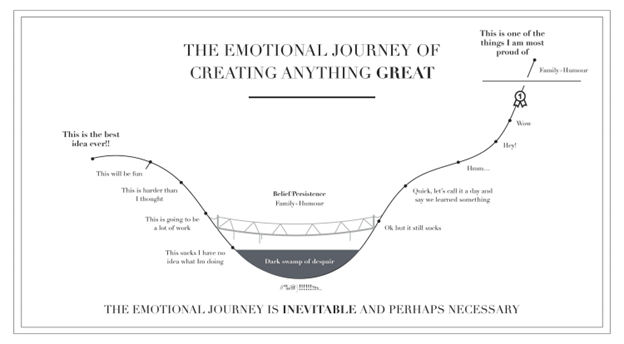Q: NewLaw is hard. Why should I stay?
Good question. I have a few thoughts.
In recent travels, I came across a group of women who appeared Amish in dress, talking and laughing with one another, and I experienced a surprising emotion—I was jealous.
For someone who runs towards the new, always testing the capability, seeing if it improves life for myself and others, and sharing it broadly if the answer is yes, the experience of jealousy when met with a conservative crew steeped in tradition (whether fair or not, some would say “frozen in time”) was puzzling.
After some self-investigation and reflection, I realized that I was envious of their sense of community. There is safety in numbers, there is also comfort in numbers. Comfort in community.
For most of my career, I’ve been so very uncomfortable. Coaches might applaud this state, shouting the tired idiom that there is no growth in the comfort zone and no comfort in the growth zone. Maybe. But also, elected discomfort is not sustainable. We lose great people this way.
This column explores why NewLaw is hard, some reasons to stay in it, anyway, and how we might make the NewLaw experience better through a purpose-built community.
Q: What are the top reasons that NewLaw is hard?
1. Being ignored. As a lawyer, thought you were on the ins? Think again. You are no longer “one of us” is what every practicing lawyer feels about you. Your bar card does not grant you inclusion. You are now different and therefore scary. The community that you thought you joined in becoming a lawyer will now ignore and likely devalue you until you prove otherwise.
2. The nag of the path untaken. Becoming a law firm partner sometimes looks so much easier. Here you are, pioneering a new path and crafting your own job descriptions when a tried-and-true partner path beckons “what if?” You’ll remember your sound reasons for why not, but you’ll have this cycle of prompt → nag → exploration → remembrance → self-reassurance → deep breath → focus on the goodness in front of you for years to come.
3. Constant creation (personal level). In NewLaw, the work is never done. In effect, in pure generational terms, it has just begun. As a result, those of us in NewLaw are in constant build mode and must show up daily with the associated energy required to create. The chart below (source unknown) perfectly captures the emotional journey.

Source: Unknown, but this version comes from Personal Excellence
Putting your whole self into your work to create something great is an investment of energy that, at times, will be astonishingly draining. NewLaw is not yet designed to account for that investment with restorative resources. You’ll be on your own to manage it.
4. Constant creation (team level). We now know that we need to move from automation—grafting technology onto traditional ways of working — to innovation—using technology not to sustain old ways of working but to work in entirely different ways. As Richard Susskind contends, this requires a “vertical view of legal work” where every task requires “a mix of legal expertise, process and technology.” See Neil Rose, “Susskind: ‘Harder than expected’ to reduce legal work to lawyer-free process,” Legal Futures, June 29, 2021.
As noted many times on Legal Evolution, this requires multidisciplinary collaboration. And for this to be effective, everyone must understand team members’ competencies and trust their areas of expertise. There is a steep learning curve that requires interpersonal curiosity and trust. Compare this to the solitude and focus of being able to sit at your desk for two days to write a complex legal brief.
5. Selling change to lawyers. From legal practice to technology and operations, legal is brimming with technicians. However, “selling” is typically not a technician’s forte. NewLaw has tried to fill this gap through traditional or adapted sales strategies with limited success given the strong culture in legal against sales and consultants, which is often where New Law gets lumped. What we need is talent that is more skilled at overcoming the significant cultural barriers to legal evolution—talent that must be developed as we go.
Through all of these challenges, the thread that binds is facing fear. Fear of rejection, self-worth, the unknown, the untrusted, and the untested. This is also what makes it interesting, and part of the reason we persist.
Q: Why stay in NewLaw when it’s so hard?
“You have been assigned this mountain to show others it can be moved.” Mel Robbins, a lawyer turned life coach. (And my fellow BC Law alumni.)
I can only speak for myself. Here’s why I stay.
I first experienced our legal system through its absence.
In post-Hurricane Katrina New Orleans, when inhabitants returned but the city remained on shaky grounds, the legal infrastructure had emptied along with the waters. Overnight, legal systems had been replaced with tanks and shoot-to-kill orders. Even months later, enforcement mechanisms lagged, and corruption proliferated. Residents were on their own. I lived in New Orleans at the time. It was alarming.
We talk about law as the fabric of our societies. The foundation on which a country is built, by which its citizens operate. We emphasize strength. And, in doing so, we shy away from vulnerability. Weakness. The cracks in the system.
I’ve seen cracks in our systems through early experiences in New Orleans when my roofer boasted about the post-Katrina boom in demand coupled with a new illegal workforce he didn’t have to pay. And at Boston College Legal Assistance Bureau in my work on Social Security Disability Insurance appeals. The theme continued while volunteering at the Women’s Bar Association in representing victims of domestic violence through family law issues, and recently through a pro bono data science collaboration with the Florida Center for Capital Representation and Georgia State University to use insights from 1,700+ cases to provide better representation to those facing the death penalty.
I’ve also seen and experienced systemic issues in the legal profession that hurt our own. The profession can feel suffocating through all the restrictions imposed by people, by mindsets, by precedent, by the unspoken and unwritten. Legal has not evolved with the times, with the people working in it.
It doesn’t have to be this way.
And that’s why I stay. This is the mountain I’ve been assigned. My purpose. To put it in context, consider that:
- The purpose of doctors is to maintain human health and well-being.
- The purpose of lawyers is to maintain social health and well-being among people, communities, and businesses.
- The purpose of New Law is to remind lawyers of their obligations to society, the legal profession, and clients and create the systems required to enable social health and well-being in ever-evolving times.
You may not yet see how New Law can and will fix the cracks. We are still in the corporate use case phase where competencies and tools are built for giants. But you will see them expand to solve broader legal and justice issues. Not as soon as I’d prefer, but it would be impossible if we quit just because it was hard.
Q: How can we make the experience of those in NewLaw better?
There is comfort in community. Here are two ways we might establish a purpose-built community.
1. Build resilience. Create a network matrixed to improve your resilience. At this stage in New Law, we can’t avoid facing fear and doing it anyway, so we might as well establish strategic support networks to build the capability to bounce back quickly.
In recent article in the Harvard Business Review, titled “The Secret to Building Resilience,” the authors suggest that our resilience is restored from multiple sources and that we focus on our top three sources. See right graphic.
2. Organize and humanize New Law. We are fragmented, scattered among Economist legal summits, CLOC, ILTA, ACC, BLC, COLPM, SOLID, the Digital Legal Exchange, and many more. How might we coalesce and organize focused modernization efforts?
We could start with humanizing New Law through the creation of a collective Purpose, Mission, and Values statement along with stories that bring them to life. Anyone game?
New Law is hard. Let’s hope it’s worth it. If I can serve as a relationship source of resilience for you, please reach out.
Originally published in Legal Evolution, December 7, 2002.














